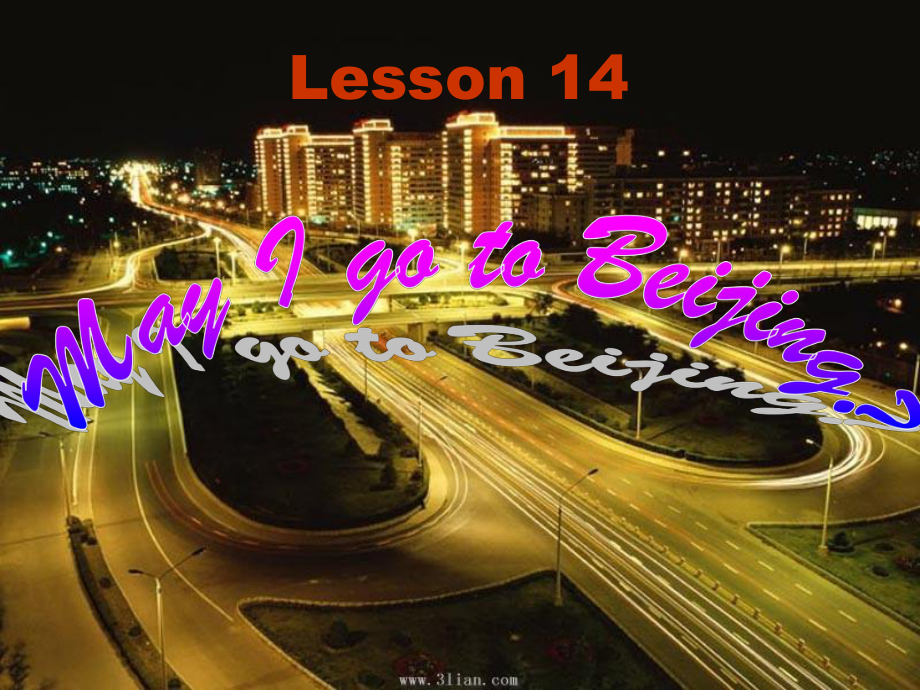《冀教版英語(yǔ)五上Lesson 14 May I G to Beijingppt課件1》由會(huì)員分享�����,可在線閱讀��,更多相關(guān)《冀教版英語(yǔ)五上Lesson 14 May I G to Beijingppt課件1(29頁(yè)珍藏版)》請(qǐng)?jiān)谘b配圖網(wǎng)上搜索����。
1、Lesson 14Its the capital city of our country.我學(xué)我學(xué)習(xí)習(xí)我快樂(lè)我快樂(lè)Tiananmen Squarethe Palace Museumthe Summer Palace the Great Wall hotel restaurantshopmay may 可以可以far fromfar from 遠(yuǎn)離tooto tooto 太太而不能而不能work hard 努力學(xué)習(xí)努力學(xué)習(xí)go shopping go shopping 去購(gòu)物去購(gòu)物I dont know.I dont know.我不知道����。我不知道。1.What does Li Ming want
2���、 to do ?Listen and answer the questions.He wants to go on a trip to Beijing.2.What does his mother think?He is too young and busy,and Beijing is far from Shijiazhuang.3.Does his mother go to Beijing with Li Ming?Yes,she does.4. How far is it from Shijiazhuang to Beijing ?Its two hundred seventy-eigh
3��、t kilometres.How does Li Ming talk to his mother ? (小提示:將課文中含有小提示:將課文中含有May I ?的句子的句子及答語(yǔ)找出來(lái)�。)及答語(yǔ)找出來(lái)。)1.Listen again and repeat, then discuss in groups.2.Show in groups.May I go on a trip to Beijing? Yes, you may.May I go to Tiananmen Square? Yes, you may.May I go shopping? Yes, you may.May I eat in
4�����、restaurants? Yes, you may.May I go to a hotel? Yes, you may.May I live in Beijing? No, you may not.(觀察上面的句子�,小組討論句式:觀察上面的句子,小組討論句式:May I�����?的用法�,然后講一講。)的用法��,然后講一講���。)Group work我我研研究我成長(zhǎng)究我成長(zhǎng)vMay I��?句型用來(lái)表示請(qǐng)求對(duì)方的許可����,在口語(yǔ)當(dāng)中�����?句型用來(lái)表示請(qǐng)求對(duì)方的許可,在口語(yǔ)當(dāng)中常用常用can代替代替may,其后面跟動(dòng)詞原形����。其回答如下其后面跟動(dòng)詞原形��。其回答如下:重點(diǎn)知識(shí)都來(lái)重點(diǎn)知識(shí)都來(lái)講講May I ����? 肯定回答肯定回答
5、 否定回答否定回答Yes, you may. Yes, please.Yes, of course.Sure.No, you may not.No, you cant.No, please dont.No��,you mustnt. Group work(用(用May I�?句型及答語(yǔ)描述下?句型及答語(yǔ)描述下列圖畫����,然后展示。)列圖畫�,然后展示。)我我練練習(xí)習(xí)我最棒我最棒G:Dad���,may I go on a trip to Beijing? B:Yes, you may.G:May I go to Tiananmen Square? B:Yes, you may.G:May I go shoppi
6�����、ng? B:Yes, you may.B and G :I may go on a trip to Beijing.B:Mum����,may I eat in restaurants?G: Yes,you may.B:May I go to a hotel? G:Yes,you may.B:May I live in Beijing? G:No,you may not.B and G:I may go on a trip to Beijing.舊曲新唱:新吉祥三寶舊曲新唱:新吉祥三寶Read the dialogue in groups. Find out the difficult points
7、that you dont understand.Then talk about them in groups.(小組讀對(duì)話��,小組讀對(duì)話��,找出疑難問(wèn)題�,并討論解決遇到的難題。)找出疑難問(wèn)題��,并討論解決遇到的難題���。)疑難問(wèn)題大疑難問(wèn)題大家家研研:1.Youre too young to go, Li Ming. 李明���,你太小了不能去。李明��,你太小了不能去����。tooto “太太而不能而不能”例如:他太小了不能上學(xué)。例如:他太小了不能上學(xué)。He is too young to go to school.疑難問(wèn)題都疑難問(wèn)題都來(lái)來(lái)講講:2.Beijing is far from our city. 北京離
8���、我們城市北京離我們城市很遠(yuǎn)���。很遠(yuǎn)。 far from 意思是意思是“遠(yuǎn)離遠(yuǎn)離”�����。例如:例如:My home is far from our school. 3.You work hard in school .你在學(xué)校很努力����。你在學(xué)校很努力�。也可以說(shuō)成:也可以說(shuō)成:You work hard at school .work hard 意為意為“努力學(xué)習(xí)努力工作努力學(xué)習(xí)努力工作”。Hard是副詞���,意為是副詞��,意為“努力地努力地”����,而而hard work 則意為則意為“艱難的工作艱難的工作”在這里在這里hard是形容詞���,是形容詞���,意為意為“困難的困難的”����。同學(xué)們快快將同學(xué)們快快將智智慧果慧果帶回家
9�、吧!帶回家吧��! Shanghai is far _ our city. A. of B. on C. by D. from -May I go to Beijing with you, Mum? -_ A .Yes,you may not. B. No,you may. C. Yes,you may. D. No,you dont.Beijing is the (首都城首都城市市)of our country.capital city -May I go to a hotel? -_ A .Yes,you may not. B. No,you may. C. No,you may not. D. No,you dont.Youre a good girl. You _ (學(xué)習(xí)很努力學(xué)習(xí)很努力)in school.work hardMay I go a trip Beijing?A. to, on B. on, to C. for, to說(shuō)一說(shuō)我們這節(jié)課學(xué)了什么��?說(shuō)一說(shuō)我們這節(jié)課學(xué)了什么����?Homework:如果周末你想去一個(gè)地方,你如何說(shuō)如果周末你想去一個(gè)地方���,你如何說(shuō)服你的父母���?服你的父母?請(qǐng)仿照課文內(nèi)容�,用上請(qǐng)仿照課文內(nèi)容,用上“May I �?”句式����,編一個(gè)對(duì)話��。句式����,編一個(gè)對(duì)話。
 冀教版英語(yǔ)五上Lesson 14 May I G to Beijingppt課件1
冀教版英語(yǔ)五上Lesson 14 May I G to Beijingppt課件1

